Power surges can be a real concern for homeowners in East Ridge, TN, especially after a storm. A sudden spike in electrical voltage can wreak havoc on your home’s electrical system, appliances, and even pose safety risks. An electrician is crucial in ensuring that damage from such surges is properly addressed and in safeguarding your home from potential future electrical issues.
In this article, we’ll explore what power surges are, why they happen, and how an electrician can help you recover from one. We will also provide tips on preventing power surge damage in the future, ensuring your home stays safe and secure.
What Is a Power Surge?
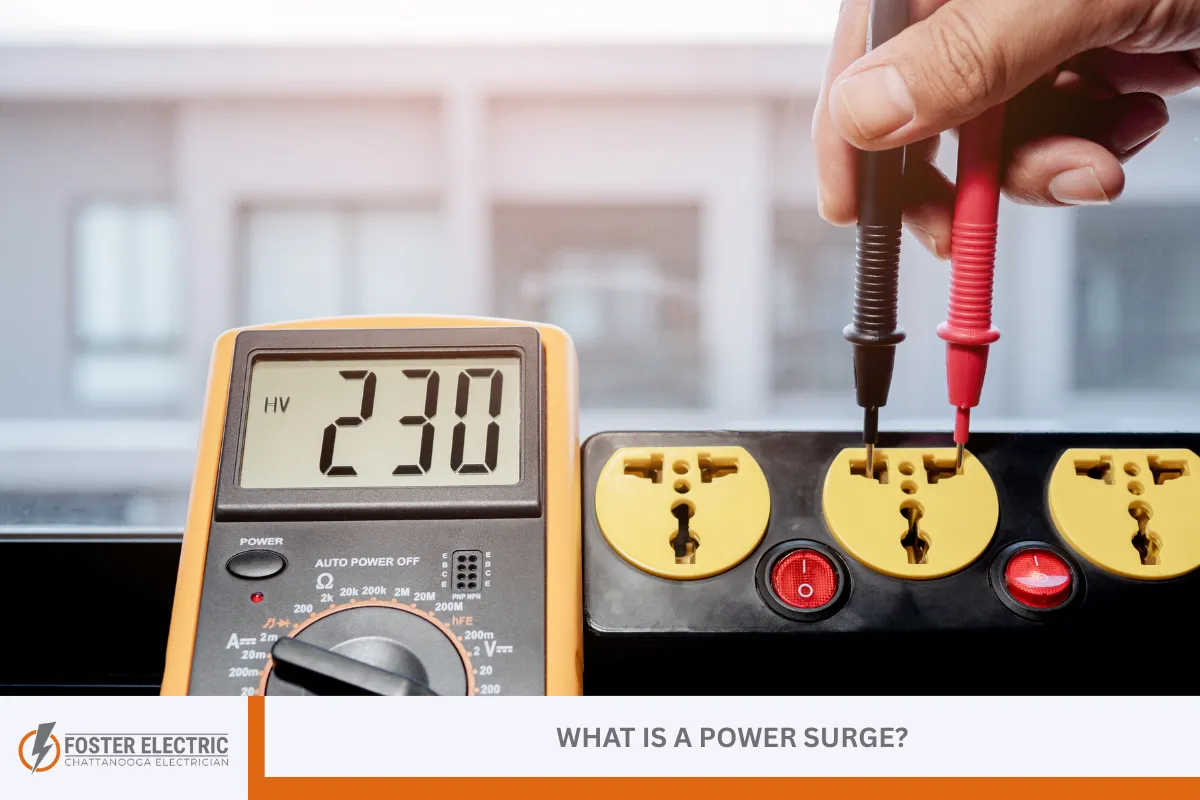
A power surge refers to a sudden increase in the electrical voltage within an electrical system. Electrical systems are designed to handle a certain amount of voltage, but when that threshold is exceeded, it can cause serious issues. These spikes typically last for a fraction of a second but can still cause significant damage to appliances, wiring, and other electrical components in your home. The most common causes of power surges are storms, lightning strikes, and faults in the power grid. A surge can also result from equipment malfunctions within your own home’s electrical system.
Understanding what a power surge is and its impact on your electrical system is crucial. It can lead to problems such as overheating appliances, malfunctioning electronics, or even complete system failures. Surge protectors can help prevent damage by redirecting excess voltage away from sensitive equipment.
Common Causes of Power Surges in East Ridge, TN
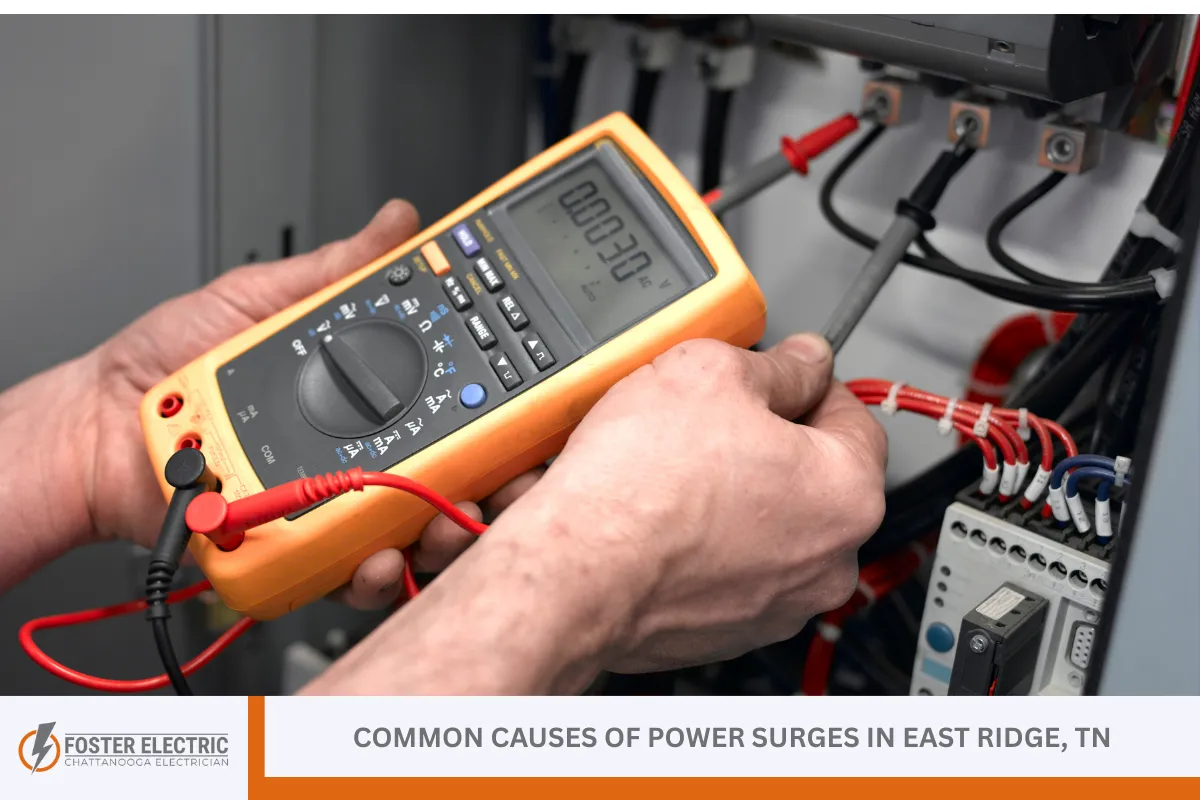
1. Lightning Strikes
One of the most common causes of power surges in East Ridge is lightning. A lightning strike to nearby power lines, transformers, or trees can cause a sudden and powerful surge of electricity that travels through the electrical grid and into your home’s system. These surges are dangerous because they happen unexpectedly and can overwhelm the protective features built into most electrical systems.
Although a lightning strike may not even need to hit your home directly to cause damage, the electrical energy from a nearby strike can cause voltage spikes in your home. The damage caused can affect sensitive electronics, such as TVs, computers, or security systems.
2. Fallen Trees and Debris
East Ridge is home to many beautiful trees, and while they add charm to the area, they also pose a risk during storms. Strong winds or heavy rain can cause trees to fall and damage power lines. The moment a power line is disconnected or restored, a surge can occur, sending electrical currents into homes along the power grid. This could easily overload electrical circuits or damage electrical appliances and devices.
Trees or large branches that come into contact with power lines can also create problems, causing intermittent power surges. These surges may be brief but are still powerful enough to cause harm to electrical systems and devices.
3. Internal Electrical Faults
Not all power surges are caused by external events. Sometimes the issue may arise from within your home’s electrical system. Overloaded circuits, faulty wiring, or malfunctioning electrical appliances can all trigger power surges. An electrical fault can send excessive electricity through your system, causing components like outlets, light fixtures, or even wiring to become damaged.
For example, plugging too many devices into one outlet can cause the circuit to overload and create a surge. Faulty appliances, such as refrigerators or air conditioners, may also contribute to power surges due to their internal electrical malfunctions.
4. Power Grid Failures
Faults or malfunctions in the broader power grid can also cause power surges. For instance, utility companies may experience equipment failure, such as damaged transformers or malfunctioning power stations. When they try to correct the problem or switch to backup systems, it can create a surge in the power supply that reaches homes.
Such power grid problems are often unpredictable and can occur even if you aren’t experiencing severe weather conditions.
How a Power Surge Can Impact Your Home’s Electrical System
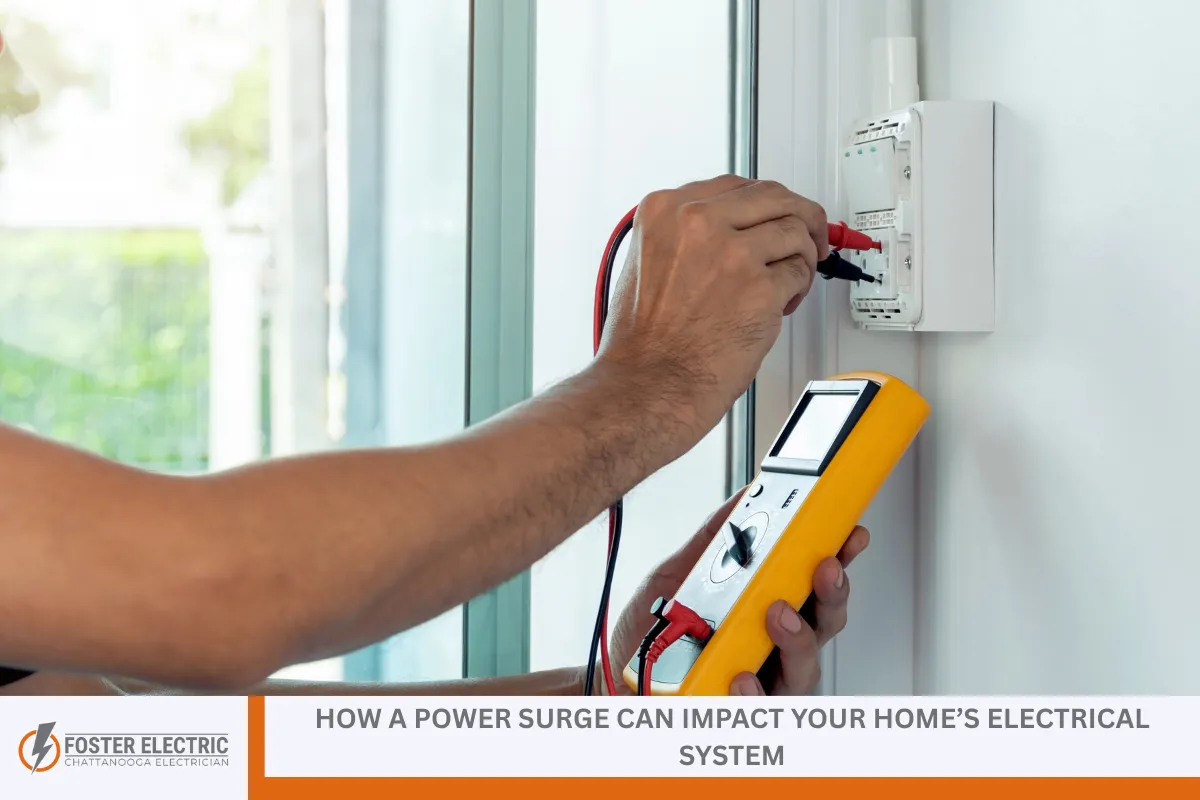
1. Appliance and Electronics Damage
One of the most immediate and noticeable consequences of a power surge is damage to electrical appliances and electronics. Devices like televisions, refrigerators, computers, and other sensitive electronics can be permanently damaged by excessive voltage. This damage could require expensive repairs or even the replacement of appliances and gadgets that were important to your daily life.
The cost of replacing or repairing these items can quickly add up. Surge damage may not always be immediately apparent, but the longer a surge remains in the system, the greater the risk of damaging devices that rely on sensitive components.
2. Electrical Fires
While rare, power surges can sometimes be so severe that they cause overheating in your home’s electrical wiring. This overheating can result in electrical fires. An electrical fire often begins when wires or outlets are exposed to excess current, which can ignite materials near the source of the surge. If the surge happens in your breaker panel or distribution system, it could compromise the safety of your home.
3. Data Loss
For those who rely on computers, power surges can be a significant concern. A surge can damage the internal components of your computer, resulting in data corruption or complete data loss. This could be particularly costly for people who store valuable or irreplaceable information on their devices.
If the surge occurs while your device is in use, it disrupts your ongoing work, resulting in lost productivity and wasted hours. Protecting data becomes more important with the increasing reliance on digital platforms in both personal and business settings.
4. System Failures and Outages
A severe power surge can damage components in your electrical system that are essential for powering the home, including your circuit breakers and the electrical panel. This can result in widespread outages, flickering lights, and even complete shutdowns. After a power surge, it’s possible to experience frequent tripped breakers, which can be a sign of serious underlying issues in the electrical system.
How an Electrician Can Help After a Power Surge
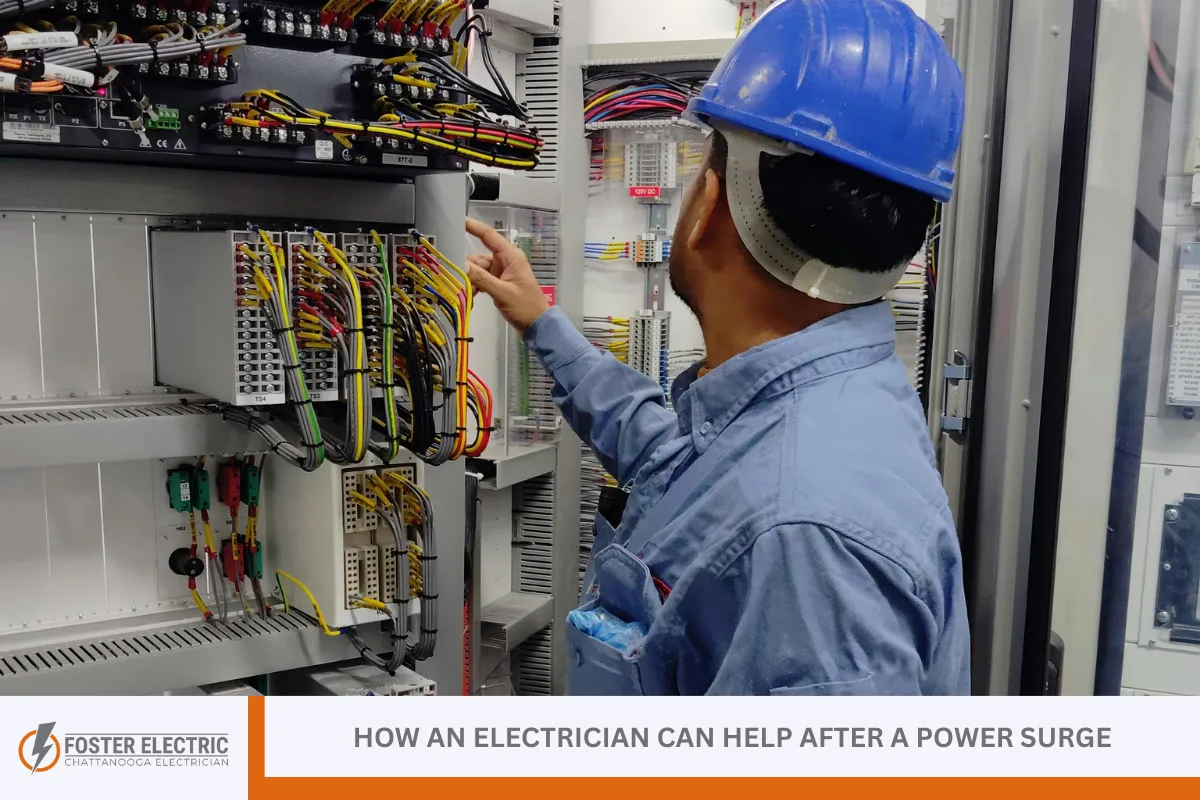
1. Thoroughly Inspecting Your Electrical System
After a power surge, an electrician’s first step is to thoroughly inspect your home’s electrical system to assess any damage caused by the surge. They will check the breaker panel, outlets, wiring, and any connected devices. This allows them to identify any components that need repairs or replacements.
A qualified electrician will ensure that everything is checked and that no lingering damage could lead to bigger issues later on. Surge damage is not always immediately apparent, so having a professional review the system is crucial.
2. Repairing or Replacing Damaged Components
Once damage has been identified, an electrician can repair or replace any faulty components. If the surge damages appliances, they may need repair or replacement. For electrical systems, replacing damaged circuit breakers, switches, or outlets is often necessary to restore full functionality.
In cases where a lightning strike or a major surge has occurred, an electrician will work with you to ensure that the necessary repairs are done efficiently and safely. This may include replacing outdated equipment that is no longer able to withstand power surges.
3. Installing Surge Protection
To prevent future power surges from causing damage, an electrician can install surge protectors. Surge protectors are devices that prevent excess voltage from reaching sensitive electronic devices. These devices can be installed at the breaker panel to protect the entire home.
Surge protectors come in a range of sizes and types, allowing your electrician to recommend the best solution for your home’s specific needs. For example, a whole-house surge protector can be installed to safeguard against larger surges, while individual plug-in surge protectors can be used for sensitive electronics.
4. Upgrading Your Electrical Panel
Older homes may have outdated electrical panels that cannot handle modern electrical demands, including power surges. An electrician may recommend upgrading your panel to one that provides better protection against surges. Newer electrical panels are designed to handle increased electricity usage and provide enhanced surge protection features.
Upgrading your electrical panel can also improve the overall safety and efficiency of your electrical system, helping to prevent potential failures or hazards in the future.
How to Prevent Power Surge Damage
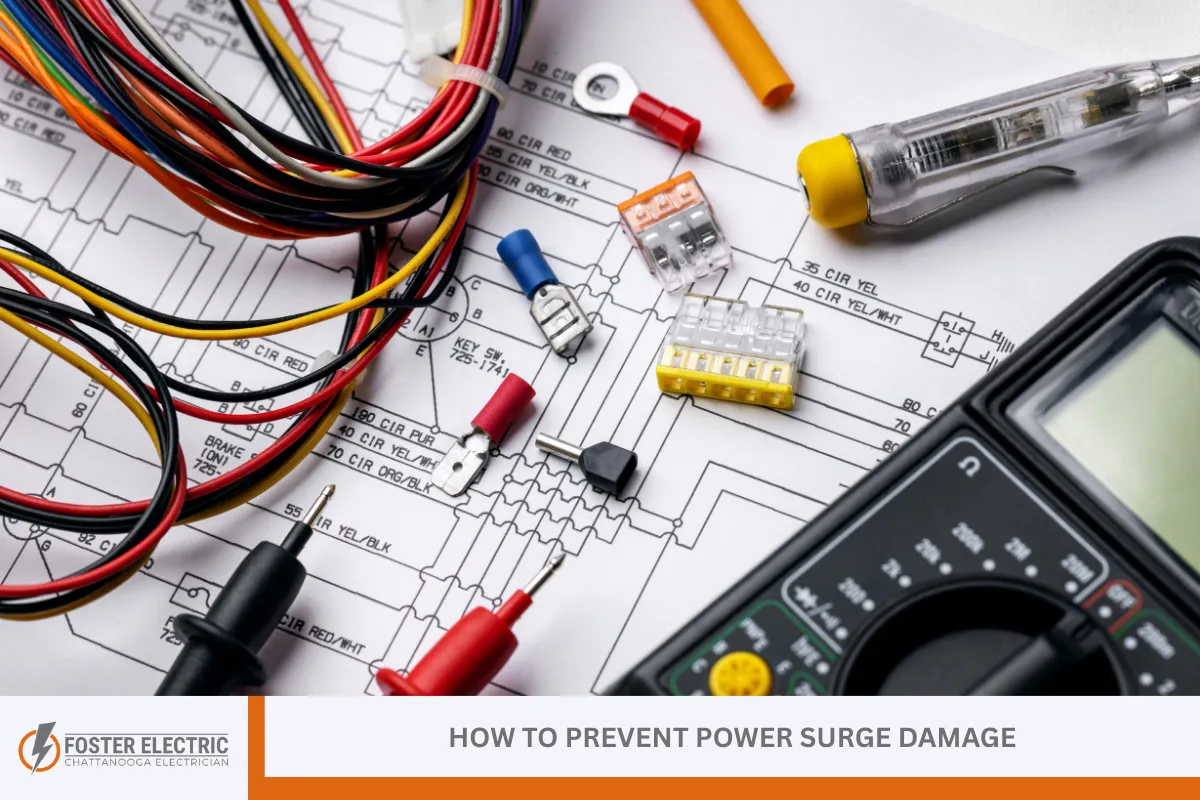
1. Invest in Whole-House Surge Protectors
Installing a whole-house surge protector is one of the most effective ways to prevent damage from power surges. These devices are connected to your electrical panel and act as a barrier, redirecting excess voltage away from the electrical components in your home.
2. Unplug Sensitive Electronics During Storms
During storms or power outages, it’s a good practice to unplug sensitive electronics such as computers, televisions, and gaming systems. This simple action can help prevent them from being damaged by an unexpected surge.
3. Upgrade Your Electrical System
If your home’s electrical system is outdated, it may be time to upgrade. An electrician can replace old wiring, outdated outlets, and your electrical panel to ensure your home is better equipped to handle modern electrical loads and power surges.
Protecting Your Home from Future Power Surges
Power surges can cause significant damage to your home’s electrical system, appliances, and even your safety. From lightning strikes to faulty wiring, the causes of surges are varied, but their impact can be severe. As we’ve discussed, calling an electrician to assess and repair any damage after a surge is crucial. They can help restore your electrical system to its optimal condition and prevent further damage through the installation of surge protection and system upgrades.
Furthermore, taking preventive measures like investing in whole-house surge protectors, unplugging sensitive devices during storms, and upgrading your electrical system can go a long way in safeguarding your home. Power surges can occur at any time, particularly during storms in East Ridge, TN; however, with the right precautions, you can reduce the risk and avoid costly repairs. By working with a professional electrician, you ensure that your electrical system remains safe, efficient, and well-protected from future surges.
East Ridge Electrician – Foster Electric
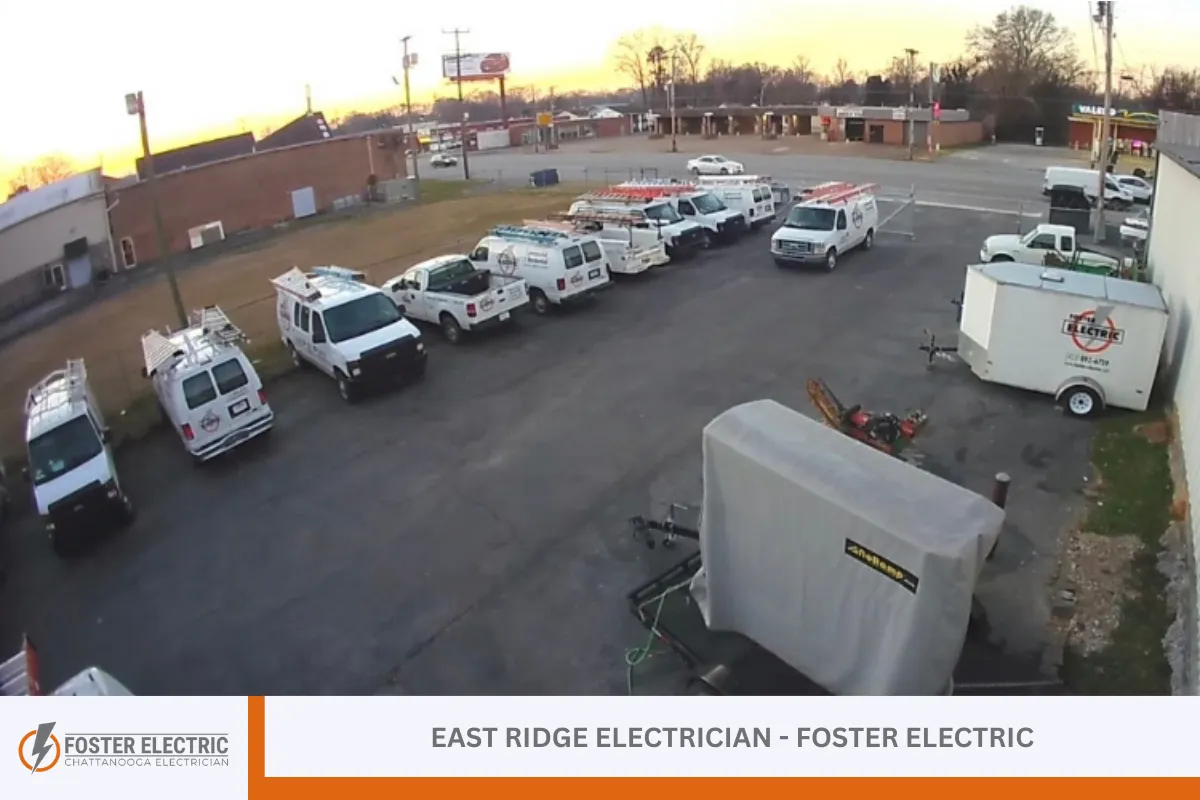
For reliable electrical repairs and surge protection in East Ridge, look no further than Foster Electric! We are dedicated to delivering exceptional electrical services to homes and businesses throughout the area. Whether you need help repairing damage from a storm surge or installing surge protection to safeguard your property, our electricians are ready to assist.
We take pride in offering dependable, friendly, and knowledgeable service. Our team is dedicated to ensuring your electrical systems are safe and efficient, providing you with peace of mind. Contact us today at (423) 826-7270 for all your electrical needs!
FAQ: Power Surges and Electrical Services in East Ridge, TN
1. What causes power surges in East Ridge, TN?
Power surges in East Ridge, TN, can occur for various reasons, but the most common cause is severe weather. Storms, lightning strikes, and fallen trees are frequent culprits. Lightning strikes can directly hit power lines or nearby structures, causing voltage spikes that travel into homes. Additionally, during storms, trees or branches may fall onto power lines, interrupting the flow of electricity and causing surges. Other causes include equipment failures in the power grid or malfunctions within your home’s electrical system. Faulty wiring or malfunctioning appliances can create surges, especially when they overload circuits. Understanding the cause of a surge is important, as different sources require different solutions.
2. How can an electrician help after a power surge?
An electrician can help in several ways after a power surge. First, they will conduct a thorough inspection of your home’s electrical system to assess any damage caused by the surge. Common issues include damaged outlets, tripped breakers, or faulty wiring.
The electrician will:
- Repair or replace damaged electrical components
- Install surge protection devices to prevent future issues
- Upgrade outdated electrical systems, such as old panels or wiring, to handle modern energy demands
- Provide advice on how to protect your appliances from future surges
A professional electrician ensures that any damage is identified and properly repaired to restore the safety and functionality of your home’s electrical system.
3. Can power surges damage appliances and electronics?
Yes, power surges can cause significant damage to appliances and electronics. These voltage spikes can cause immediate damage to sensitive components within devices such as televisions, refrigerators, computers, and other electronic devices. When a surge occurs, the excess voltage can damage or destroy circuit boards or fry electrical components. Often, the damage is irreversible, and the device may cease to function entirely. Even if the damage isn’t immediate, prolonged exposure to power surges can shorten the lifespan of your electronics. In some cases, it may take a while before you notice the effects, such as flickering screens or malfunctioning appliances. To safeguard your electronics, it’s recommended to use surge protectors or unplug devices during storms.
4. How can I prevent power surges in the future?
Preventing power surges involves both proactive measures and proper maintenance of your home’s electrical system. Here are a few steps to protect your home:
- Install a Whole-House Surge Protector: This device, connected directly to your electrical panel, helps protect all appliances and electronics in your home from power surges.
- Use Surge Protector Power Strips: Plug sensitive electronics, such as computers and televisions, into surge protector strips to shield them from voltage spikes.
- Unplug Electronics During Storms: When a storm is predicted, unplug your sensitive electronics to prevent potential damage.
- Upgrade Your Electrical System: If your home’s electrical system is outdated, consider upgrading to a modern system that provides better protection and reliability.
By following these simple steps, you can reduce the risk of damage from power surges and ensure your electrical devices remain safe.
5. How do I know if a power surge has damaged my electrical system?
After a power surge, you may notice signs that your electrical system or appliances have been affected. Here are a few key indicators:
- Frequent Tripped Circuit Breakers: If your circuit breakers are tripping frequently, it could be a sign of damage caused by a surge.
- Flickering Lights: If your lights flicker or dim unexpectedly, it may indicate a power surge has affected your electrical system.
- Appliances or Electronics Not Working: Appliances such as your refrigerator, computer, or television may stop functioning after a surge.
- Burnt Smells or Sparks: Any burning smells or visible sparks from outlets, light fixtures, or appliances should be addressed immediately.
If you experience any of these signs, it’s essential to contact a licensed electrician to assess the damage and make necessary repairs. Ignoring these issues can lead to more significant electrical hazards, including fires.
Read more: Protecting Your Home: Surge Protection Tips from a Local Residential Electrician in East Ridge, TN
